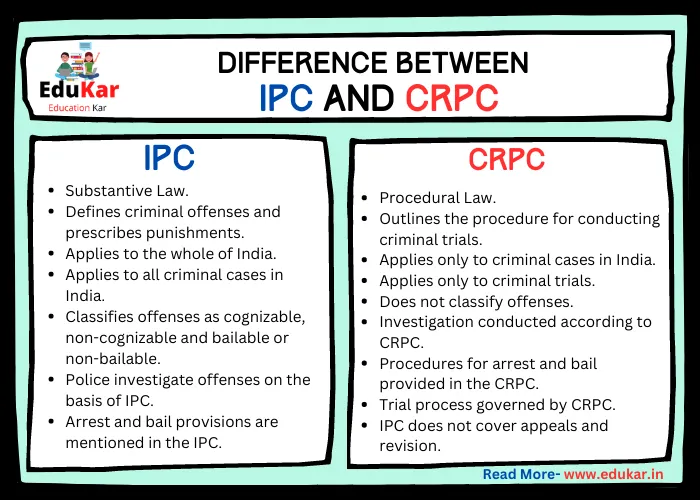Contents
- 1 Introduction
- 2 IPC (Indian Penal Code)
- 3 CRPC (Code of Criminal Procedure)
- 4 Differences between IPC and CRPC (Tabular Form)
- 5 Differences between IPC and CRPC in Points
- 6 Importance of understanding the difference between IPC and CRPC
- 7 Summary
- 8 FAQs
- 8.1 What does IPC stand for?
- 8.2 What does CRPC stand for?
- 8.3 What is the main difference between IPC and CRPC?
- 8.4 What kind of offences are covered by IPC?
- 8.5 What does CRPC cover?
- 8.6 Can IPC and CRPC be applied separately?
- 8.7 Are there any similarities between IPC and CRPC?
- 8.8 Who is responsible for enforcing IPC and CRPC?
- 8.9 Can a person be punished under IPC without following CRPC?
- 8.10 Can IPC and CRPC be amended?
This article by Edukarexplains the key differences between IPC (Indian Penal Code) and CRPC (Code of Criminal Procedure) in the Indian legal system. Learn about the distinct purposes, procedures, and provisions of these two important laws that govern criminal offenses in India.

Introduction
In the Indian legal system, the Indian Penal Code (IPC) and the Code of Criminal Procedure (CRPC) are two fundamental legal codes that play a significant role in maintaining law and order in the country. IPC deals with crimes and punishments, while CRPC outlines the procedures to be followed in criminal cases. It is crucial to understand the difference between IPC and CRPC to understand the Indian criminal justice system better.
IPC (Indian Penal Code)
The Indian Penal Code, established in 1860, is a comprehensive code that defines crimes and their punishments. IPC lays down the framework of substantive criminal law in India. It comprises various chapters that deal with specific crimes such as murder, theft, fraud, and so on. IPC also defines the punishments for each crime, which may include imprisonment, fines, or both.
Also Read: Difference between National Anthem and National Song
CRPC (Code of Criminal Procedure)
The Code of Criminal Procedure, established in 1973, provides the procedural framework for dealing with criminal cases in India. CRPC lays down the rules and regulations that must be followed by the police, courts, and lawyers in criminal cases. It covers various aspects such as the investigation, arrest, trial, and sentencing of accused individuals. CRPC aims to ensure fair and just treatment of accused individuals while maintaining the integrity of the legal process.\
Differences between IPC and CRPC (Tabular Form)
| Factor | IPC | CRPC |
|---|---|---|
| Type of Law | Substantive Law | Procedural Law |
| Purpose | Defines criminal offenses and prescribes punishments | Outlines the procedure for conducting criminal trials |
| Jurisdiction | Applies to the whole of India | Applies only to criminal cases in India |
| Application | Applies to all criminal cases in India | Applies only to criminal trials |
| Offense Classification | Classifies offenses as cognizable, non-cognizable and bailable or non-bailable | Does not classify offenses |
| Investigation | Police investigate offenses on the basis of IPC | Investigation conducted according to CRPC |
| Arrest and Bail | Arrest and bail provisions are mentioned in the IPC | Procedures for arrest and bail provided in the CRPC |
| Trial Process | IPC does not cover trial process | Trial process governed by CRPC |
| Appeals and Revision | Appeals and revision are covered under CRPC | IPC does not cover appeals and revision |
| Role of Lawyers | IPC does not specifically cover the role of lawyers | CRPC provides for the role of lawyers in trials |
Differences between IPC and CRPC in Points
1. Purpose and scope: The primary purpose of IPC is to define crimes and their punishments. IPC outlines the acts that constitute a crime and prescribes the appropriate punishment for each crime.
CRPC’s primary purpose is to provide the procedural framework for dealing with criminal cases. CRPC lays down the rules and regulations that must be followed in criminal cases to ensure fair and just treatment of accused individuals.
2. Focus and approach: IPC focuses on the substantive aspects of criminal law. It lays down the rules and principles that must be followed while determining the guilt or innocence of an accused individual. IPC adopts a more rigid and formal approach to criminal law, with an emphasis on the letter of the law.
CRPC, focuses on the procedural aspects of criminal law. It lays down the rules and regulations that must be followed by the police, courts, and lawyers while dealing with criminal cases. CRPC adopts a more flexible and informal approach to criminal law, with an emphasis on the spirit of the law.
3. Structure and contents: IPC is divided into various chapters that deal with specific crimes such as murder, theft, and fraud. Each chapter lays down the rules and principles that must be followed while dealing with that particular crime. IPC provides a comprehensive list of crimes and their punishments, making it easier for legal professionals and law enforcement agencies to understand and apply the law.
CRPC is divided into various sections that deal with specific aspects of criminal law such as investigation, arrest, trial, and sentencing. Each section lays down the rules and regulations that must be followed while dealing with that particular aspect of criminal law. CRPC provides a detailed procedural framework that must be followed to ensure fair and just treatment of accused individuals.
Also Read: Difference between Gram Sabha and Gram Panchayat
4. Application and implementation: IPC is primarily applied by law enforcement agencies and the judiciary while dealing with criminal cases. Law enforcement agencies use IPC to investigate and prosecute accused individuals, while the judiciary uses it to determine guilt or innocence and prescribe appropriate punishments.
CRPC is applied by law enforcement agencies, the judiciary, and legal professionals while dealing with criminal cases. Law enforcement agencies use CRPC to conduct investigations and arrests, while the judiciary uses it to conduct trials and pronounce judgments. Legal professionals such as lawyers and advocates use CRPC to represent their clients in criminal cases.
Importance of understanding the difference between IPC and CRPC
Understanding the difference between IPC and CRPC is crucial for legal professionals, law students, and anyone interested in the Indian legal system. Some of the reasons why it is essential to understand these differences are:
1. Legal implications:
IPC and CRPC have a significant impact on the Indian legal system. A proper understanding of these codes is essential for legal professionals to provide accurate legal advice to their clients. Moreover, the judiciary relies heavily on these codes to determine the guilt or innocence of an accused individual and prescribe appropriate punishments. A lack of understanding of these codes can lead to inaccurate judgments and cause injustice.
2. Social impact:
IPC and CRPC play a crucial role in maintaining law and order in the country. A proper understanding of these codes is essential for law enforcement agencies to carry out their duties effectively. Moreover, the codes have a direct impact on the lives of ordinary citizens. A proper understanding of these codes can help citizens to be aware of their rights and responsibilities and avoid getting involved in criminal activities.
3. Role in the justice system:
IPC and CRPC are the backbone of the Indian criminal justice system. A proper understanding of these codes is essential for legal professionals, law enforcement agencies, and the judiciary to carry out their duties effectively. Moreover, these codes ensure that accused individuals are treated fairly and justly during the legal process.
4. Significance for legal professionals and law students:
Legal professionals and law students must have a thorough understanding of IPC and CRPC to provide accurate legal advice to their clients and perform their duties effectively. A lack of understanding of these codes can lead to inaccurate legal advice and cause injustice. Therefore, legal professionals and law students must study these codes thoroughly and keep themselves updated on any changes or amendments made to these codes.
Also Read: Difference between Cabinet and Council of Ministers
Summary
IPC and CRPC are two fundamental legal codes that play a significant role in the Indian legal system. Understanding the differences between these codes is crucial for legal professionals, law students, and anyone interested in the Indian legal system. The proper application of these codes ensures that accused individuals are treated fairly and justly during the legal process, and justice is served. Therefore, it is essential to study these codes thoroughly and keep oneself updated on any changes or amendments made to these codes.
FAQs
What does IPC stand for?
IPC stands for Indian Penal Code, which is the main criminal code of India.
What does CRPC stand for?
CRPC stands for Criminal Procedure Code, which is the procedural law for conducting criminal trials in India.
What is the main difference between IPC and CRPC?
IPC defines various criminal offences and prescribes punishments for them, while CRPC outlines the procedures to be followed during a criminal trial, from investigation to conviction or acquittal.
What kind of offences are covered by IPC?
IPC covers a wide range of criminal offences, including but not limited to murder, theft, assault, rape, and fraud.
What does CRPC cover?
CRPC covers the procedures to be followed by law enforcement agencies, courts, and other authorities during a criminal trial, including arrest, investigation, bail, trial, and sentencing.
Can IPC and CRPC be applied separately?
Yes, IPC and CRPC can be applied separately depending on the nature of the case. For instance, if someone is accused of a criminal offence, IPC will be used to determine whether the offence has been committed and what punishment should be imposed, while CRPC will be used to conduct the trial.
Are there any similarities between IPC and CRPC?
Yes, there are some similarities between IPC and CRPC. For instance, both laws are part of the Indian legal system and are designed to ensure that justice is served.
Who is responsible for enforcing IPC and CRPC?
IPC and CRPC are enforced by law enforcement agencies such as the police, as well as the judiciary, which includes the courts and judges.
Can a person be punished under IPC without following CRPC?
No, a person cannot be punished under IPC without following the procedures outlined in CRPC. The procedures laid down in CRPC ensure that the accused is given a fair trial and due process is followed before any punishment is imposed.
Can IPC and CRPC be amended?
Yes, both IPC and CRPC can be amended by the Indian Parliament to reflect changing societal values and needs. However, any such amendments must be done in a transparent and democratic manner, and should not compromise the rights of the accused.




![Best 5 Speech on Yoga [Long & Short] Speech-on-Yoga](https://edukar.in/wp-content/uploads/2023/03/Speech-on-Yoga.webp)
![Speech on Subhash Chandra Bose [Short & Long] Speech-on-Subhash-Chandra-Bose](https://edukar.in/wp-content/uploads/2023/03/Speech-on-Subhash-Chandra-Bose.webp)










